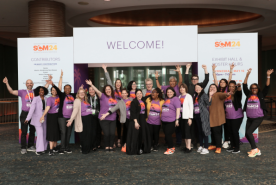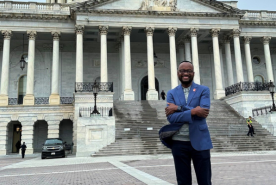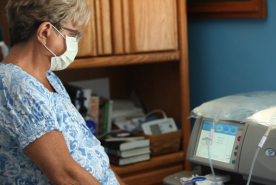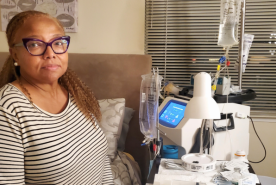July 30, 2019
NKF, Amgen and AstraZeneca are proud to continue the tradition of recognizing excellence in nephrology by hosting the 14th Annual National Young Investigators Forum. Regional winners competed for national accolades based on original research. Final awards were determined through an open competition that was judged by independent clinical experts.
We interviewed the first and second place winners in the clinical research category to learn more about their passion for making lives better for chronic kidney disease patients.
Vishnu Potluri, MD, MPH: 1st PlaceDaniel Edmonston, MD: 2nd Place
Vishnu Potluri: 1st Place
MD, MPH, University of Pennsylvania, Philadelphia, PA
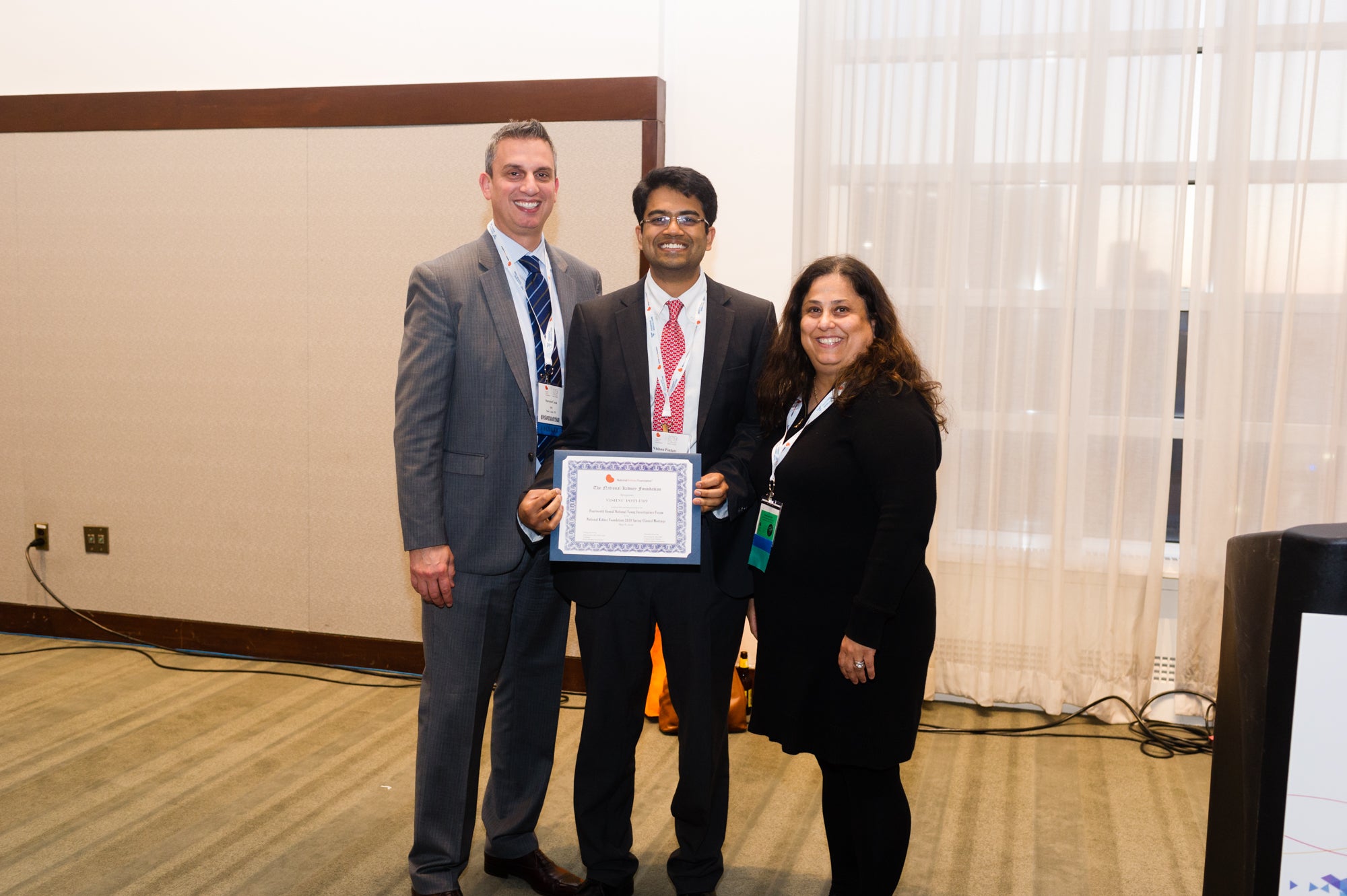
Do you have a personal connection to kidney disease?
My father has stage 4 kidney disease. I was a first-year nephrology fellow when I learned about the diagnosis. Initially, it was very stressful due to the uncertainty that surrounds kidney disease. Many changes were required, and my father and my family had to make dietary and lifestyle adjustments. But, we eventually figured out a path for my father to continue to work, travel, and very occasionally cheat on the diet plan so he can enjoy his favorite foods! Going through the process of dealing with kidney disease at a personal level was an eye-opening experience. It made me realize the importance of trying to meet individual goals for each patient. I also recognize that at least initially, a 30-minute clinic visit with a specialist is (probably) not sufficient to deal with the complex nature of kidney disease.
How was your experience at the young investigators Forum and what did winning the award mean to you/your research?
The forum was a fantastic opportunity to meet researchers who are passionate about advancing our knowledge of kidney disease. Importantly, the meeting brought together young investigators from across the country into a single room. I hope that the relationships we build in these meetings will translate into research collaborations!
I am also grateful to the selection committee for recognizing our work for the young investigator award. Clinical research is team science, and our project is no different - the outcome reflects excellent mentorship and advice from collaborators.
How/Why did you choose this area of study? (Your path to this project and to research/nephrology)
Even before I joined my internal medicine residency, I was fascinated by transplant science. But, I had no clue about how to conduct a research project or become a transplant physician. It was my mentor who guided me at a critical time in my career. I give my mentors full credit for molding me into the researcher and clinician that I am today. Through our work, I learned that kidney discard (kidneys that are donated but not transplanted) is a critical issue in nephrology. My current project and others that I have performed seek to reduce unnecessary kidney discard.
What do you enjoy most about research/nephrology?
The best part of my job is that I get to divide my time between taking care of my patients and pursuing my research interests. As nephrologists, we have the privilege of taking care of our patients for many years and build a level of trust that not many specialties have. Moreover, I get to use my research time to answer issues that my patients face in the clinic. These are some of the factors that make me want to come to work every day!
What is the most challenging aspect of your day to day work?
The toughest aspect of my day is balancing the needs of my nascent research career and at the same time spend enough time with my family (and my one-year-old son)! I am still trying to figure it out, but there is no doubt that my son gets the priority!
Can you explain to a lay-person, why is your research important to the future of kidney disease treatment or diagnosis? (i.e. why would patients and families suffering want to know about your work?)
Over 90,000 people are currently waiting for a kidney transplant. Most patients will wait for at least 5-years before they get a kidney transplant. My research focuses on identifying solutions to reduce the wait-time to a kidney transplant. Unfortunately, 20% of all donated kidneys in the US are never transplanted. There are many reasons why we do not transplant a kidney – but a well-known reason is a concern about its quality. By reducing organ discard, we can reduce the wait-time to transplant for everyone. My research focuses on reducing organ discard to improve access to transplantation.
How do you predict the landscape of kidney disease (diagnosis, research, treatment) will change in the next five years?
I see our field going through a gradual transformation in many fronts. But there are three areas that I am optimistic will give the most benefit. First, I think we will see a greater emphasis on quality of life as an important patient (and clinical) outcome. Second, I predict (somewhat hopefully) an increase in clinical trials that generate new data. Finally, we will see a greater emphasis on limiting kidney disease and its complications. I think the recent government announcement recognizing the importance of improving kidney care is exciting for all of us!
Advice for budding researchers/nephrologists?
I think mentorship and persistence are two essential elements at an early stage in the research career. If you ever feel bad when a manuscript (or grant) gets rejected – do not lose hope and know that you are not alone! I also found that feedback after a rejection helped me improve my work.
Daniel Edmonston: 2nd Place
MD, Duke University School of Medicine, Durham, NC
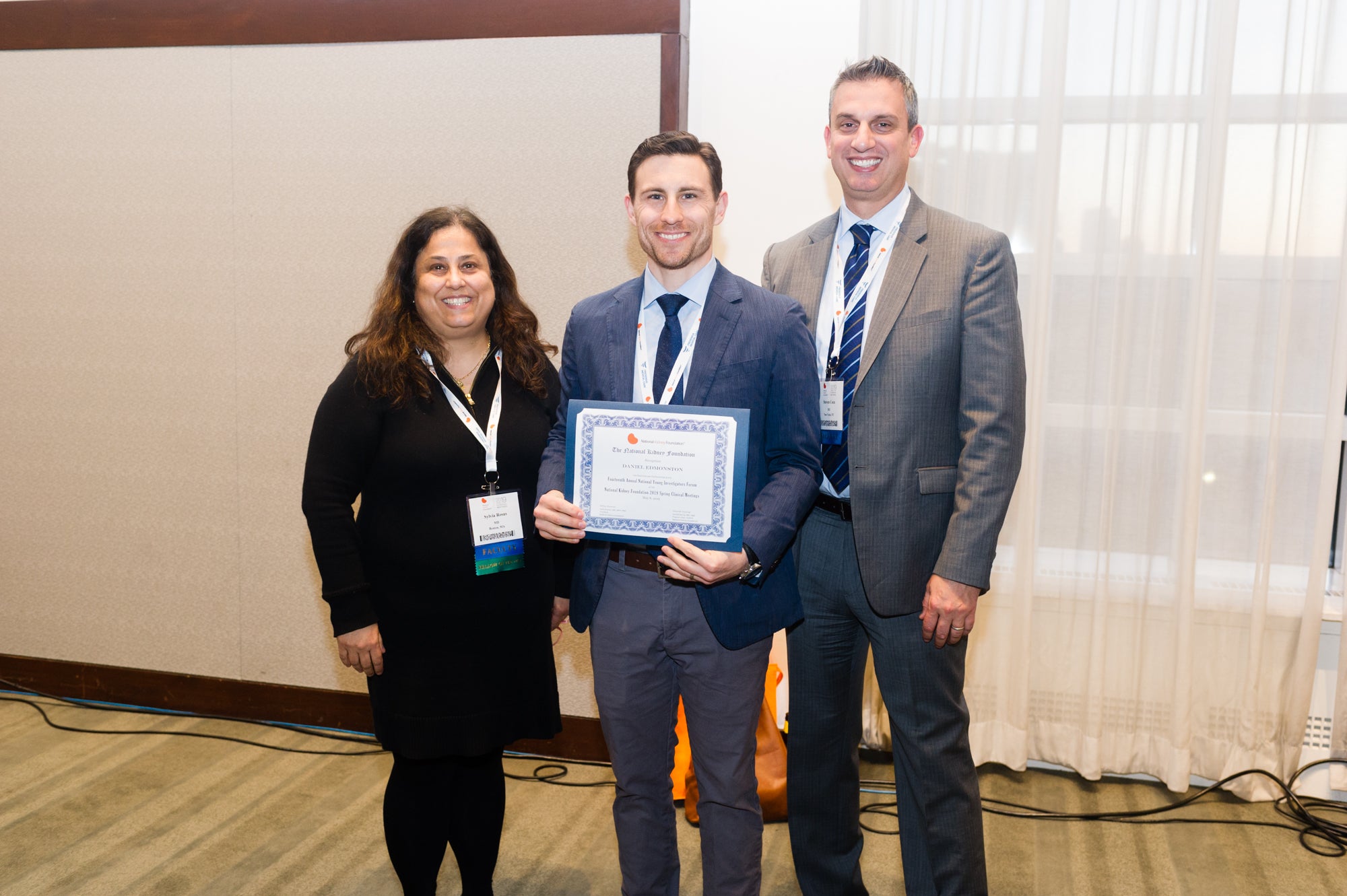
Do you have a personal connection to kidney disease?
I have multiple family members with various levels of chronic kidney disease, but thankfully most of them only developed this issue later in life.
How was your experience at the Young Investigators Forum and what did winning the award mean to you/your research?
I had the honor of competing in the NKF Young Investigators' Forum for the past two years. I most valued the opportunity to meet and network with leaders and rising stars within kidney research. Research is a demanding career filled with much more rejection and failure than success. To have our research recognized with this award means a great deal to me.
How/Why did you choose this area of study? (Your path to this project and to research/nephrology)
Despite amazing advances in many areas of cardiovascular research, we still understand very little about the role kidney disease plays in certain types of heart disease. Some of the sickest patients I cared for during my medicine and nephrology training had both pulmonary hypertension and kidney disease. These patients left a lasting impression on me and serve as inspiration for the current focus of my research.
What do you enjoy most about research/nephrology?
I cherish the one-on-one relationships with patients in clinical practice. However, quality research has the opportunity to change the care for generations of patients. Until recently, nephrology as a field starved for innovation that moved the needle for patient care. Recent advancements, especially within diabetic kidney disease treatment, provide hope and excitement to early-career researchers like me.
What is the most challenging aspect of your day to day work?
Balance. I thrive when I can immerse myself in a task to completion. However, the life of a physician scientist often requires attention to patient care, research, and administrative tasks simultaneously.
Can you explain to a lay-person, why is your research important to the future of kidney disease treatment or diagnosis? (i.e. why would patients and families suffering want to know about your work?)
Heart disease remains the most common cause of disease and death for persons with kidney disease. In order to combat this risk, we need to understand the cause of these heart diseases so that we can develop targeted treatments. Our research suggests our current understanding and approach to the treatment of pulmonary hypertension in kidney disease is incomplete. Importantly, our work hints that the mechanism may be similar to certain types of pulmonary hypertension which have many effective treatments.
How do you predict the landscape of kidney disease (diagnosis, research, treatment) will change in the next five years?
A rising tide lifts all ships. The recent advancements in diabetic kidney disease will raise the bar for all future kidney research. I am confident the quality of kidney research will rise to this challenge and persons with kidney disease will benefit.
Advice for budding researchers/nephrologists?
Step out of your comfort zone. My decision to pursue a career in research was a leap of faith taken late in my training. Like a medical student on the first day of clinical rotations, we all struggle at first to secure our footing and confidence. Lastly, find a quality mentor with experience training young investigators to independence and success.
If you couldn't be a nephrologist what would you do for a living?
I would be a teacher in some capacity.

